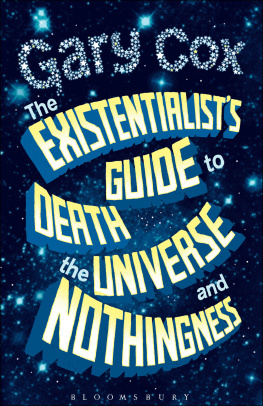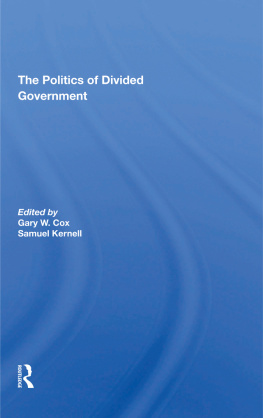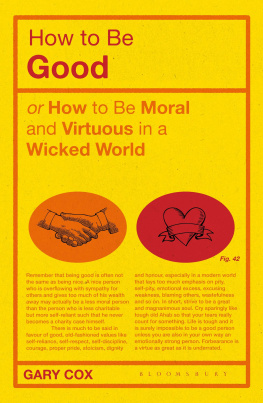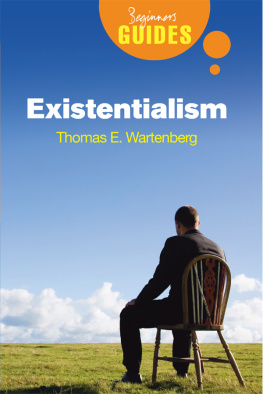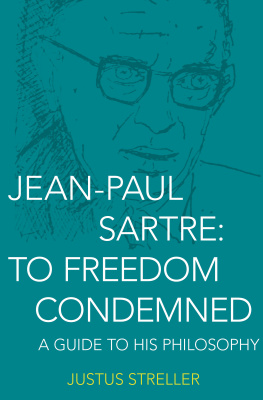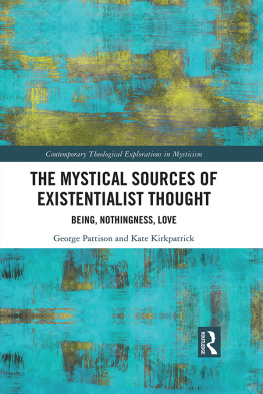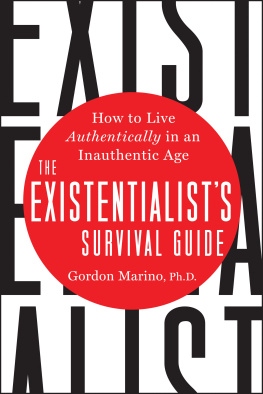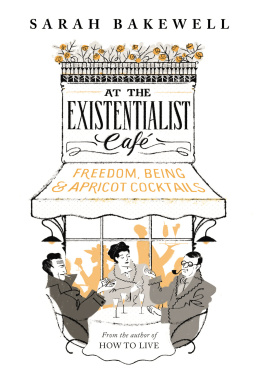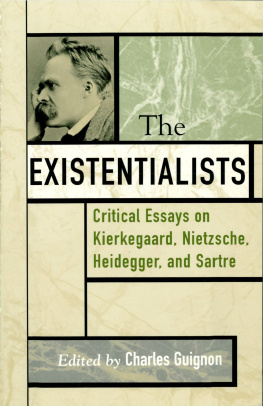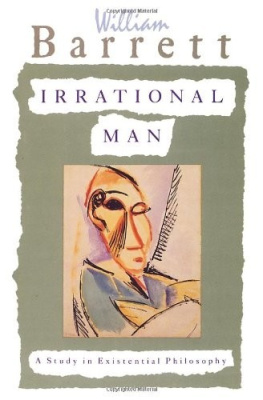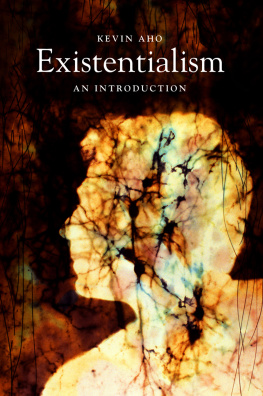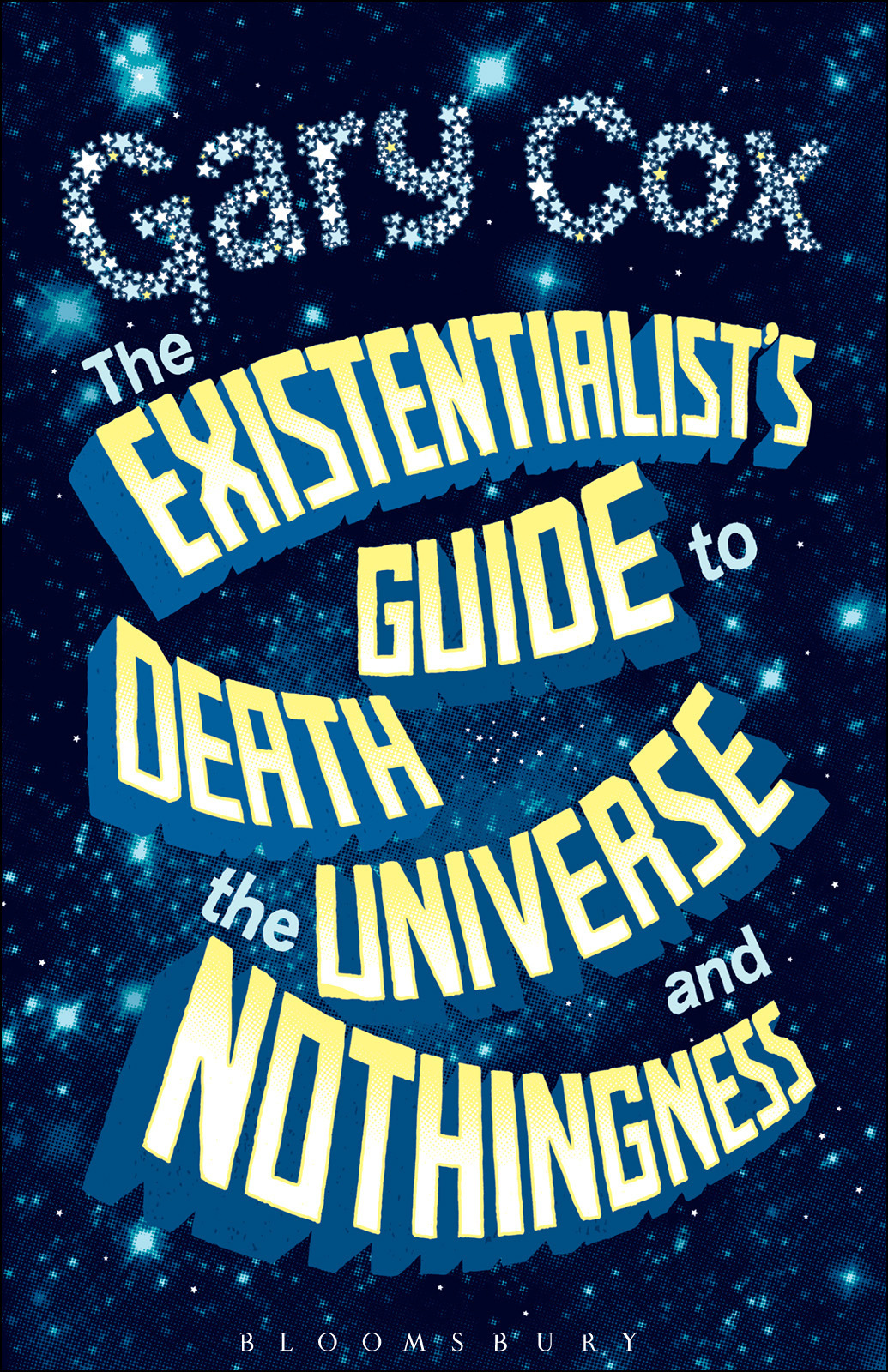The Existentialist's Guide to Death, the Universe and Nothingness
By the same author:
How to Be an Existentialist
How to Be a Philosopher
The Existentialist's Guide to Death, the Universe and Nothingness
Gary Cox
Contents
Ive long been a fan of Douglas Adams The Hitchhikers Guide to the Galaxy , his fabulous guide to life, the universe and everything. His unique blend of humour, science fiction and philosophy had a big influence on me as a youngster back in the 1980s and certainly helped inspire me to go ahead and study philosophy at university.
If Ive got anywhere nearer to answering a central question that Adams poses Why are people born? Why do they die? Why do they want to spend so much of the intervening time wearing digital watches? ( The Hitchhikers Guide to the Galaxy , p. 119) it is only to say that ultimately there is probably no reason for any of it. Adams conclusion that forty-two is the answer to the question, What is the meaning of life, the universe and everything?, aims to illustrate that there is really no satisfactory answer and that the problem lies in the question itself. Un-ask the question, as the Buddhists say.
Existentialists tend to argue that life only has the meaning each individual person chooses to give it. Thinking about the existentialists response to Adams question and how many of Adams profound thoughts existentialists would identify with generally, started me thinking what an existentialists guide to life, the universe and everything would be like. What ideas and themes would existentialists include in a guide aimed at the would-be existentialist wanting to hitchhike around the universe of existentialism?
Well, in such a guide there wouldnt be a lot of talk about space travel. Existentialists are very grounded creatures, not least in the sense of being preoccupied with down to earth human life, experience and interaction as lived and suffered in the urban environment. Still, what the existentialists say about the human condition would also apply to any aliens on other planets if, like us, those aliens were organic, embodied, conscious, intelligent, social and mortal.
The existentialists view of human life is very much coloured by their view of mortality, their view that to be human is to be a being-towards-death engaged in an unavoidably finite life project. This is not morbidity on the part of existentialists, simply honesty and a no-nonsense approach to the so-called fundamental existential truths of the human condition . Their preoccupation with death as a fundamental truth would lead them, I think, to place death as opposed to life in the very title of their guide, just to remind people where existentialism is coming from philosophically and where we are all ultimately heading existentially.
Similarly, they would want to refer to nothingness rather than everything in the title of their guide because of the monumental role the phenomenon of nothingness plays in the existentialist world-view generally. As this guide explains, nothingness for existentialists is the basis of consciousness, and it is only when the negating power of consciousness arises that the universe gets carved up into the distinct phenomena that we experience. For existentialists, nothingness does not lie beyond the end of the universe. It is what each of us is a nothingness in relation to being, endlessly striving to be at one with itself and the world. If you found this paragraph confusing yet strangely intriguing then this guide is definitely for you.
The Hitchhikers Guide to the Galaxy famously warns its readers: Dont panic! Existentialists certainly recognise the importance of not panicking when confronting lifes many difficulties. Like Adams, they recommend facing up to reality with positive and decisive choices and actions. They might above all else, however, prefer to warn people: Dont despair!
Even though life is ultimately absurd and pointless anyone who doesnt see this is trying to live in a fairy tale it is still possible to give life relative meaning and value by facing every challenge with courage and dignity and striving to achieve realistic goals. To set unrealistic goals is to try to live the fairy tale, it is to hanker after impossibilities like total happiness and complete fulfilment. The existentialists argue that if you want to be happy, or at least be happier, give up struggling for total happiness as that path inevitably leads to frustration and disappointment.
This guide explores a fascinating range of interrelated themes central to the philosophy of existentialism, from time, death and nothingness to love, hate and sexual desire. But a word of warning! This guide is full of tough, uncompromising existential truths about the human condition that some people will find physically, emotionally and philosophically disturbing. Existentialists are like everyone else free, responsible, mortal, abandoned the only difference is existentialists know it, dont try to deny it and strive to make the most of it. Welcome to the existentialists hard-edged world-view. Can you handle it? Can you get real?
It is important to stress that this book is a guide to existentialism for people who may or may not be aspiring existentialists. It is not a rule book, a book of existentialist law saying existentialists must think this and do that wear certain clothes, eat certain foods, perform certain rituals and mumble certain words. As the guide itself shows, existentialism is not about laying down the law like some fool religion designed for sheep. It is all about encouraging people to tune into their inalienable freedom and to think and act for themselves. Above all, it is about encouraging people to take personal responsibility for their choices rather than blaming the decisions they make and the actions they take on rules or the system or society or other people or the great wide indifferent universe generally.
You can dip into this guide or read it from cover to cover. Im confident that either way you will get a huge amount out of it and will forevermore be the centre of attention at parties when the subject of existentialism crops up. If you dont go to the sort of parties where the subject of existentialism crops up then perhaps you are going to the wrong sort of parties. Wrong parties, right parties, its all a matter of taste and personal choice, a matter of the value you yourself place on things.
You can certainly use this guide as a good, old-fashioned reference book, consulting it whenever you feel the need. Perhaps at difficult or special times and crucial crossroads in your life. At any time when you find yourself moved to ponder what it is existentialists tend to believe about freedom, anxiety, childhood, authenticity, indifference, sadomasochism, absurdity or God.
How you use this guide is of course your choice, as any existentialist worth his or her salt will tell you. Choose to use this guide for information and inspiration or choose to use it as a door wedge. Choose, if you must, to use it as a little rule book bible. However you use it, whatever you do, its your doing, your existential choice, your responsibility, and no real business or concern of mine.
What about you, madame? he inquired. Are you an existentialist? I can still recall my embarrassment at this question. (Simone de Beauvoir, The Prime of Life , p. 547)
An existentialist is a person whose work and ideas contribute to existentialism, or anyone who broadly subscribes to the theories and outlook of existentialism and attempts to live and die according to its principles. So, to understand what an existential ist is you need to understand what existential ism is. Ill explain what existentialism is shortly. Meanwhile, it is fair to say that to be a true existentialist a person has to know a fair amount about the philosophy and outlook of existentialism, more or less believe in existentialism rather than dismiss it as drivel and, above all, continually strive to live according to existentialism. She has to walk the walk of existentialism, not just talk the talk. She must continually strive to achieve what existentialist philosophers call authenticity .

